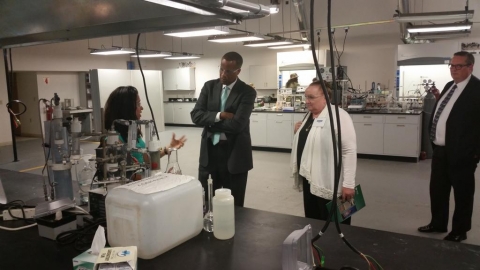Sep092015
Posted at 2:19 PM
The Department of Commerce’s Economic Development Administration (EDA) is the only federal agency solely focused on economic development. While economic development can take many forms (e.g., infrastructure, technical assistance, planning), workforce development is an especially critical tool to strengthening America’s workforce. Ensuring that American workers are trained with the skills they need to compete in the 21st century economy is a high priority for President Obama and the Administration, the Department of Commerce, and EDA.
An example of that commitment was announced today when the White House released a Progress Update on Job Driven Training and Apprenticeships, detailing the success of the Administration’s jobs-driven training efforts. Two EDA programs are highlighted in the report:
- Comprehensive Economic Development Strategies (CEDS): One of EDA’s roles is to help regional planning organizations with their economic development efforts, including the creation of regional economic development plans called Comprehensive Economic Development Strategies (CEDS). EDA has incorporated job-driven training principles in its new CEDS content guidelines, which provide recommendations and tools to help regions develop strong CEDS. EDA’s goal is to see more CEDS with strong, job-driven workforce development. A great example is Centralina Economic Development Commission CEDS, which has an entire section devoted to aligning jobs and workforce education.
- Communities that Work Partnership: In April 2015, the Department of Commerce and the Aspen Institute launched a nationwide effort to recruit and select communities to participate a new learning exchange that builds regional partnerships to accelerate and document more effective, employer-led regional workforce initiatives across America. Seven communities, including New York City, Washington D.C., Greater Houston, San Francisco Bay Area, Buffalo and Northeast Georgia, and Greater Phoenix have now begun a 15-month intensive learning exchange designed around each region’s pursuit of job-driven talent development strategies to promote economic growth. The idea is that these communities will develop replicable methods and practices that any community can use to improve their workforce training efforts.
EDA also supports workforce development through its Public Works and Economic Adjustment Assistance grant programs. EDA has established “job-driven skills development” as an investment priority for its competitive grants. Since the integration of the job-driven training principals, EDA has invested in a wide variety of projects through all of its programs that help make these principals a reality in American communities. In fact, to-date during Fiscal Year 2015, EDA has awarded more than $20 million in grants to support workforce training and the Department’s ‘Skills for Business’ initiative across the country, including:
- In Brenham, Texas, EDA awarded $1.4 million for a technical training center to train displaced workers who lost their jobs due to changes in the oil and gas industry as well as a result of the closure of the Blue Bell ice cream plant.
- In Southeast Iowa, EDA awarded more than $1 million to build an industrial maintenance and technology training program on Southeastern Community College’s Keokuk Campus.
- In Meridian, Mississippi, EDA awarded $1.5 million to expand an existing workforce development center that has reached capacity, enabling Meridian Community College to offer training in industrial maintenance, manufacturing/distribution, electrical technology, truck driving, and construction trade technology.
There are many more examples of how EDA is supporting multiple industries and communities across the country, and EDA will continue to do its part to ensure that Americans are ready to work and have the skills employers need.

